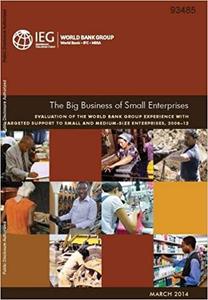
Free Download World Bank, "The Big Business of Small Enterprises: Evaluation of the World Bank Group Experience with Targeted Support to Small and "
English | ISBN: 1464803765 | 2015 | 258 pages | EPUB | 11 MB
The World Bank Group promotes small and medium enterprise (SME) growth through both systemic and targeted interventions. Targeting means focusing benefits on one size-class of firms to the exclusion of others. Targeted support for SMEs is a big business for the World Bank Group, averaging around $3 billion a year in commitments, expenditures, and gross exposure over the 2006-12 period.
In the context of broader reforms, such targeted support can be a powerful tool. Targeting SMEs is not an end in itself, but a means to create economies that can employ more people and create more opportunity for citizens to achieve prosperity. A thriving and growing SME sector is associated with rapidly growing economies.
A central challenge is to level the economic playing field by ensuring dynamic markets; strengthening market-support institutions; and removing constraints to participation. IEG found that financial sector development can have both a pro-growth and propoor impact by alleviating SMEs’ financing constraints, enabling new entry of firms and entrepreneurs and better resource allocation. Layered on top of this are targeted forms of assistance; these interventions may build on a foundation of more systemic reforms, may come in tandem with them, or may in fact be a means to build systemic reforms from the bottom up.
Any credible justification of targeted support to SMEs must be focused on establishing well-functioning markets and institutions, not simply providing a temporary supply of benefits to a small group of firms during a project’s lifespan. Thus, targeted interventions need to leverage resources to produce broader benefits for institutions and markets.
To make targeted support for SMEs more effective, the World Bank Group needs to do several things:
* Clarify its approach to targeted support to SMEs.
* Enhance the support’s relevance and additionality.
* Institute a tailored research agenda.
* Strengthen guidance and quality control for such support.
* Reform MIGA’s Small Investment Program.
Read more
